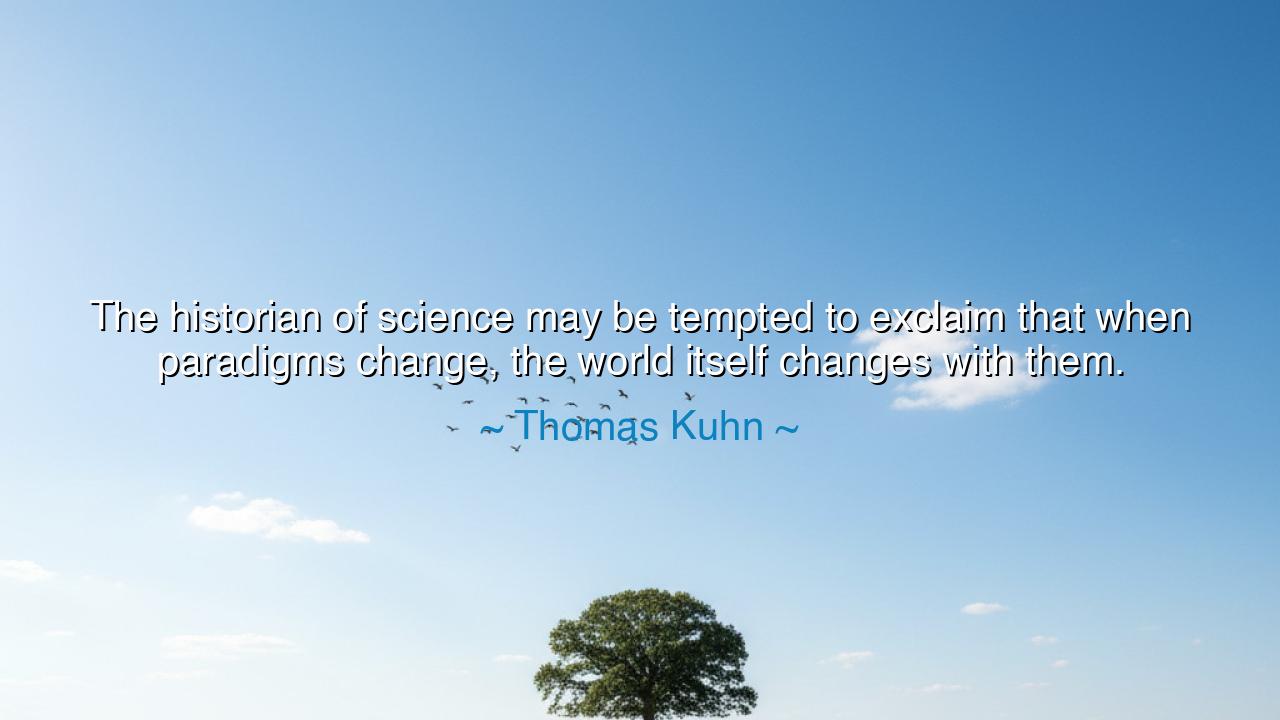
The historian of science may be tempted to exclaim that when
The historian of science may be tempted to exclaim that when paradigms change, the world itself changes with them.






Hear, O children of wisdom, for the words of Thomas Kuhn strike at the very heart of our understanding of change, of knowledge, and of progress. He said: “The historian of science may be tempted to exclaim that when paradigms change, the world itself changes with them.” These words, though spoken in a modern age, are steeped in a deep understanding of the nature of human knowledge and the forces that drive it. Kuhn’s insight reveals a powerful truth: that the paradigms, the foundational frameworks through which we see the world, shape not only our understanding of science, but our understanding of reality itself. When these paradigms shift, the very fabric of our existence is altered, as if a new veil is lifted from our eyes, revealing a world we had not previously seen.
What, then, does Kuhn mean, O seekers of truth? A paradigm is the lens through which we view the world—our set of assumptions, our way of interpreting the facts that confront us. The paradigm shapes not just the science of the day, but the culture, the society, and the very fabric of reality that we inhabit. When a paradigm shift occurs, when the accepted way of thinking is suddenly overturned by a new idea or discovery, it does not just change science; it changes everything. It alters our sense of what is possible, of what is known, and of what can be achieved. The world, in essence, changes because we are no longer seeing it through the same lens.
Let us reflect on the story of Copernicus, whose revolutionary idea that the Earth revolved around the Sun shattered the paradigm of geocentrism, the belief that the Earth was the center of the universe. For centuries, humanity had viewed the cosmos through this lens, guided by the teachings of Aristotle and Ptolemy. The Earth was believed to be the immovable center of the universe, and all celestial bodies revolved around it. But when Copernicus proposed the heliocentric theory, it was not just a scientific discovery—it was a paradigm shift that fundamentally altered humanity’s understanding of its place in the universe. The very structure of the cosmos was transformed in the minds of those who accepted this new idea. The world itself changed, for once this paradigm took root, people no longer saw themselves as the center of creation but as one part of a vast, ever-expanding universe.
This shift did not come easily—for centuries, the church and many scholars resisted the heliocentric model, holding on to the old paradigm with all their might. But the paradigm eventually shifted, and with it came an entirely new understanding of the cosmos. Galileo, with his telescope, proved the truth of Copernicus’ theory, and Isaac Newton later provided the laws of motion and gravitation that explained the mechanics of the solar system. The scientific revolution, born from this paradigm shift, changed the world forever. Humanity’s understanding of the universe was no longer confined to an Earth-centered view, but opened up a new realm of exploration and possibility. And so, as Kuhn suggests, the world itself changed—not just the science, but the very way people thought about the universe, their place in it, and their potential to understand it.
Consider, O children, the more recent shift in the paradigm of physics that arose in the 20th century with the work of Einstein and the advent of quantum mechanics. The world of classical physics, based on Newtonian mechanics, saw a universe that was orderly, predictable, and governed by rigid laws. But when Einstein introduced the theory of relativity, and when the strange world of quantum physics was uncovered, a new and bewildering paradigm emerged. Suddenly, the universe was not the clockwork mechanism once believed, but a dynamic, relational system where time and space were flexible, where particles could exist in multiple states, and where the nature of reality itself became uncertain. The world, as Kuhn suggests, changed because our paradigm had shifted, and with it, the very nature of science itself became something fluid, open to new possibilities and mysteries.
The lesson here, O children of the future, is this: When a paradigm shifts, the world itself shifts. This is the power of knowledge, of discovery, and of understanding. What we think we know today may one day be overturned by a new idea, a new way of seeing the world, and this shift will not just change science, but will change everything. The world is not fixed, but is shaped by the ideas and beliefs that we hold, and when those ideas change, so too does the world we inhabit. It is the nature of human progress to constantly seek new paradigms, new ways of understanding, and in doing so, to change the very world in which we live.
Therefore, O children of the future, do not be afraid of change. Do not fear the shifting of paradigms. Embrace the unknown, for it is in the unknown that the greatest discoveries are made. Seek the truth, not as something fixed and final, but as a dynamic force that evolves with the shifting tides of knowledge. As you journey through life, be open to new ideas, for it is in those ideas that the world will change, and in turn, you will change with it, shaping the future with the power of new understanding. Remember: the paradigm you hold today may one day give way to a greater truth, and with that shift, a new world will unfold before you.






AAdministratorAdministrator
Welcome, honored guests. Please leave a comment, we will respond soon